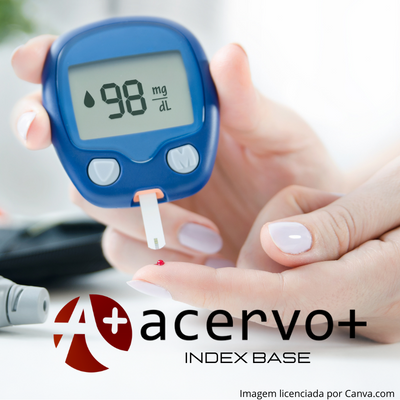A influência do autocuidado e das fontes de apoio social no manejo do diabetes mellitus tipo 1
##plugins.themes.bootstrap3.article.main##
Resumo
Objetivo: Compreender por meio de uma revisão narrativa como o autocuidado e as fontes de apoio social influenciam no manejo do Diabetes Mellitus Tipo 1 (DM1). Revisão bibliográfica: DM1 é uma doença autoimune decorrente da destruição das células β pancreáticas, resultando na deficiência completa na produção de insulina. É uma das condições crônicas mais comuns na infância e as suas manifestações clínicas iniciais são, em geral, abruptas. O diagnóstico de DM1 é similar ao do indivíduo adulto e o paciente diabético descompensado pode apresentar algumas complicações clínicas. O autocuidado é um componente fundamental na gestão do DM1, ao propiciar o envolvimento da pessoa em seu tratamento e maior adesão ao esquema terapêutico, minimizando complicações e incapacidades associadas aos problemas crônicos. O apoio social, também, é uma estratégia benéfica para o enfrentamento efetivo do DM1, uma vez que é uma forma de oferta de suporte, apoio afetivo, emocional e material. Considerações finais: DM1 é um desafio constante para os seus portadores, tendo em vista a dificuldade presente em aderir ao novo estilo de vida e às mudanças comportamentais necessárias para promover um controle efetivo da doença. Por isso, o autocuidado e as fontes de apoio social se tornam influências positivas no manejo do DM1.
##plugins.themes.bootstrap3.article.details##
Copyright © | Todos os direitos reservados.
A revista detém os direitos autorais exclusivos de publicação deste artigo nos termos da lei 9610/98.
Reprodução parcial
É livre o uso de partes do texto, figuras e questionário do artigo, sendo obrigatória a citação dos autores e revista.
Reprodução total
É expressamente proibida, devendo ser autorizada pela revista.
Referências
2. ANJOS SS, et al. Educação em saúde no manejo de crianças e adolescentes acometidos com Diabetes Mellitus Tipo 1. Research, Society and Development, 2022; 11(8): e4211830549-e4211830549.
3. BATISTA AFMB, et al. Gestão do Diabetes Tipo 1: necessidades de autocuidado apoiado na transição para adolescência. Saúde e pesqui.(Impr.), 2020; 13(2): 363-375.
4. BRUTSAERT EF. 2020. In: Manual MSD, Versão para Profissionais da Saúde. Diabetes Melito (DM). Disponível em: https://www.msdmanuals.com/pt/profissional/dist%C3%BArbios-end%C3%B3crinos-e-metab%C3%B3licos/diabetes-melito-e-dist%C3%BArbios-do-metabolismo-de-carboidratos/diabetes-melito-dm. Acessado em: 25 de julho de 2022.
5. COLLET N, et al. Autocuidado apoiado no manejo da Diabetes tipo 1 durante a transição da infância para adolescência. Revista da Escola de Enfermagem da USP, 2018; 52: e03376.
6. DOMENICO CT, MENDES-CASTILLO AMC. Apoio social da criança com diabetes tipo 1 e sua família. Rev. enferm. UFPE online, 2017; 11(12): 5020-5027.
7. GIWA AM, et al. Current understandings of the pathogenesis of type 1 diabetes: Genetics to environment. World Journal of Diabetes, 2020. 11 (1): 13-25.
8. GOMIDES DS, et al. Autocuidado das pessoas com diabetes mellitus que possuem complicações em membros inferiores. Acta Paulista de Enfermagem, 2013; 26(03): 289-293.
9. GRILLO CFC, et al. Janela da escuta: o adolescente especialista de si e a tessitura de uma rede sob medida. Belo Horizonte: Editora UFMG, 2022; 717 p.
10. HERMES TSV, et al. Criança diabética do tipo 1 e o convívio familiar: repercussões no manejo da doença. Saúde em Debate, 2018; 42(119): 927-939.
11. HILL K, et al. “I kind of gave up on it after a while, became too hard, closed my eyes, didn't want to know about it” - adults with type 1 diabetes mellitus describe defeat in the context of low social support. Health Expectations, 2019; 22(2): 254-261.
12. INTERNATIONAL DIABETES FEDERATION (IDF). Diabetes Atlas. 2021. Disponível em: https://diabetesatlas.org/atlas/tenth-edition/. Acessado em: 25 de julho de 2022.
13. MACHADO NA, et al. Doença crônica infantojuvenil: vínculo profissional-família para a promoção do apoio social. Revista Gaúcha de Enfermagem, 2018; 39: e2017-0290.
14. MARQUES BLJ. Desafios para o autocuidado de adolescentes portadores de Diabetes Mellitus tipo 1: revisão integrativa. Trabalho de Conclusão de Curso (Bacharelado em Enfermagem). Universidade de Brasília, Brasília, 2020; 24 p.
15. PALMEZANO-DIAZ JM, et al. Características clínicas y sociodemográficas de pacientes con diabetes tipo 1 en un Hospital Universitario de Colombia. Medicina interna de México, 2018; 34(1): 46-56.
16. PENNAFORT VPS, et al. Rede e apoio social no cuidado familiar da criança com diabetes. Revista brasileira de enfermagem, 2016; 69(5): 912-919.
17. PETERMANN XB, et al. Epidemiologia e cuidado à Diabetes Mellitus praticado na Atenção Primária à Saúde: uma revisão narrativa. Revista Saúde (Santa Maria), 2015; 41(1): 49-56.
18. PORTH CM, KUNERT MP. Fisiopatologia. 9ª ed. Rio de Janeiro: Guanabara Koogan, 2016; 1672 p.
19. SILVA MEA, et al. Rede e apoio social na doença crônica infantil: compreendendo a percepção da criança. Texto & Contexto Enfermagem, 2017; 26(1): e6980015.
20. SOCIEDADE BRASILEIRA DE DIABETES. Diretriz Oficial da Sociedade Brasileira de Diabetes. 2022. Disponível em: https://diretriz.diabetes.org.br/. Acessado em: 26 de julho de 2022.
21. SOCIEDADE BRASILEIRA DE PEDIATRIA. Diabetes Mellitus tipo 1 e Autocuidado. 2018. Disponível em: https://www.sbp.com.br/fileadmin/user_upload/_21143d-DC_-_DMellitus_tipo_1_e_Autocuidado.pdf. Acessado em: 25 de julho de 2022.
22. SOUZA LCVF, et al. Diabetic ketoacidosis as the initial presentation of type 1 diabetes in children and adolescents: epidemiological study in Southern Brazil. Revista Paulista de Pediatria, 2019; 38: e2018204.
23. VILAR L. Endocrinologia clínica. 6ª ed. Rio de Janeiro: Guanabara Koogan, 2016; 1686 p.
24. VON BORRIES D, et al. Asociación entre síntomas depresivos de las madres y control metabólico en adolescentes con Diabetes Mellitus tipo 1. Revista chilena de pediatría, 2020; 91(2): 190-198.

